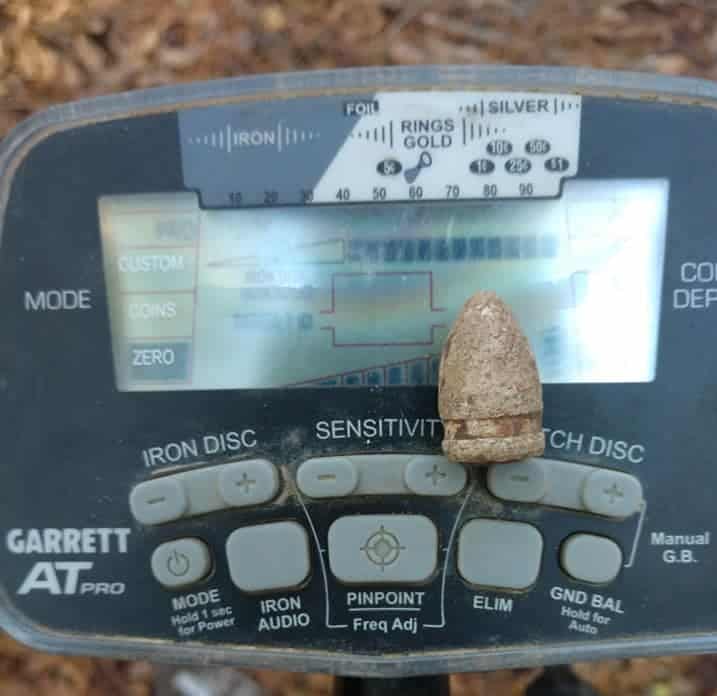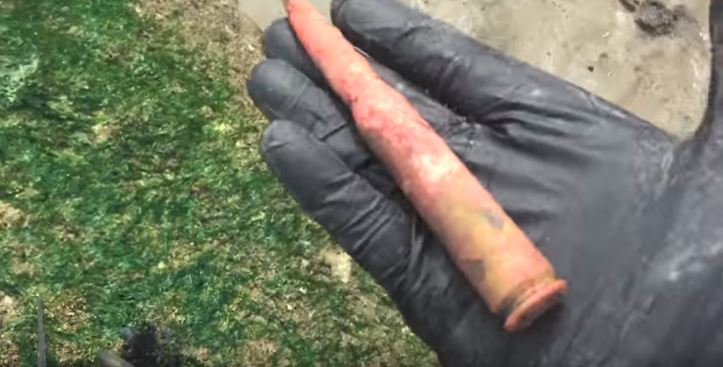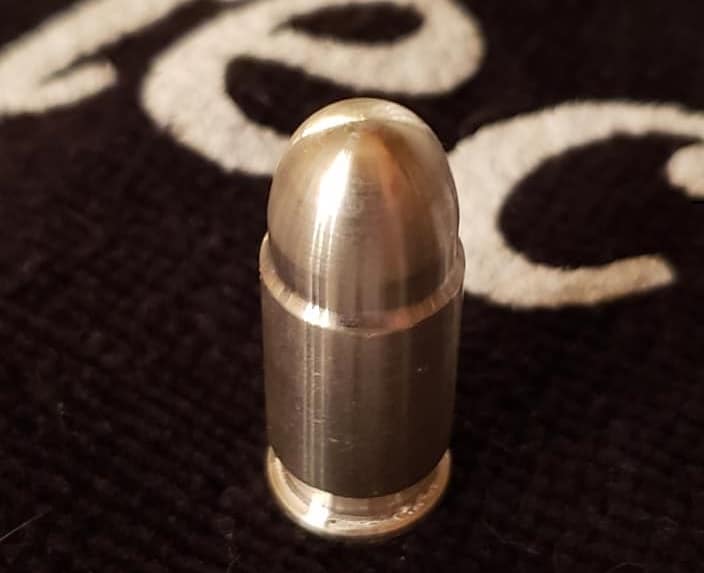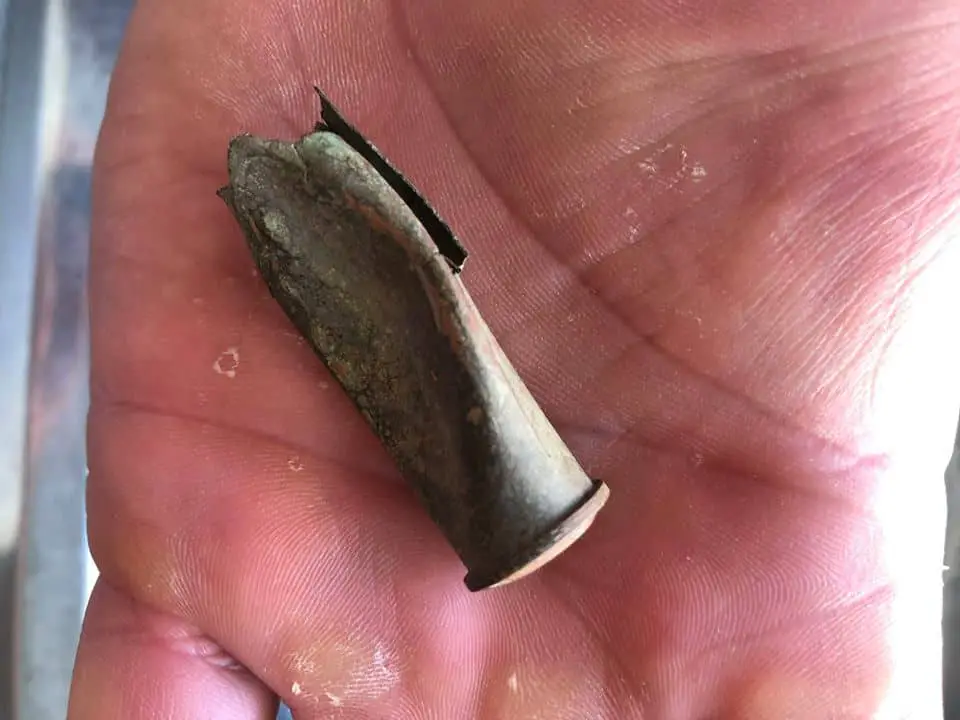
As a beginner, you’ve probably wondered whether a metal detector could find bullets or not. Indeed, I’ve asked the same exact question before and I would like to share my thoughts about it.
Can Metal Detectors detect Bullets? You can absolutely detect bullets using a decent quality metal detector or even a pinpointer if you can already locate accurately the ammunition. Indeed, bullet’s composition is mainly based on electrical conductor metals. They generate an electric current any metal detector can detect which leads you to your find.
There are other types of bullets that you can hardly find depending on their composition. Yet, most of them (especially classical lead bullets) are commonly detectable.
It is also important to be aware of locations in which you are more likely going to find old bullets. Not to mention, the importance of being able to accurately identify them using some simple tips that I will share with you!
By the way, I’ve written a thorough in which I list and explain what can detectors detect, you will learn a lot of helpful info!
Key Takeaways:
- Lead-based bullets are easily detectable by most metal detectors due to their conductive metal nature.
- Historical sites (battlefields & old settlements) are amazing locations for finding old ammunition.
- To properly identify bullet age and type you need to rely on factors like depth as well as nearby items.
Bullet’s Composition is what makes it a detectable item
Most bullets are metal jacketed! The jacket’s composition is mostly based on alloy (zinc and copper mix). It covers the ammunition inside that has likely lead.
The jacket could also have steel or even silver in some rare cases! All these metals are electrical conductors which allows your detector to find the ammunition like any other regular find.
Bullets could be in different sizes, but even the smaller ones have still a considerable size to be detectable.
In this image you can see this bullet find which is pretty big:

Keep in mind, that you can find beautiful undamaged bullet like this one:

Or you can find an exploded bullet that might be a little bit harder to identify and also to find. This find is a good example:

Types of bullets you can’t (or can hardly) find
Less-lethal (sometimes called non-lethal) bullets, like the ones made from plastic and rubber are not detectable (Or at least not easily so).
In fact, carbon and hydrogen are not metal elements and they represent the main composition of rubber.
Yet, for bullets coated with rubber with a metal inside, those could be detectable using a detecting tool with a decent penetration.
This applies also for plastic bullets! However, I’ve never heard of ones that are coated with plastic … The ones I know are fully plastic so they won’t be found using conventional methods. Not to mention, that this kind of ammunition won’t be that interesting to be found by those who look for old stuff. Especially that they were firstly used in the mid-70s by the British army.
What Metal Detector should you use to find bullets?
Lead and zinc/copper alloy based items are commonly founds using a good VLF detector. There is no real need to use a specific one or even an expensive device for this purpose (like a PI or Gold machine).
However, you should keep in mind that bullets are generally small, that’s why you need to make sure that your detector operates on a decent frequency. So it will be more sensitive to them …
… And also that it has a good ability to discriminate well, especially if you are dealing with trashy areas!
For this purpose, you can check my favourite metal detector at Amazon to have more ideas on what you might need!
Places when you will likely find ammunition …
If you are interested in collecting old ammunitions, you need to be aware of locations you will likely find them. I mean you won’t find them in your backyard … will you?
Expert Tip:
If you choose to target areas that have witnessed historical battles, then, it is important to set your metal detector with a high-frequency setting. This will make it more sensitive to small, corroded bullets, as they are often missed by standard frequencies.
It is pretty obvious that civil war sites are the ones where you will very likely collect bullets pretty easily. Of course if these sites are replaced by buildings, roads and things like that, then this won’t be possible, obviously!
The best place to find them will be fields, woods or even beaches that have witnessed civil wars!
Digging for bullets would depend on whether you have a local mobility or an international mobility.
Locally, you probably have to be aware of civil wars that took place in your country or local region. So you will target them directly after you get the permission from the land owner or the local authorities. Don’t hesitate to do some research about civil war sites in your region. That is, you may find out sites you didn’t know about before and that are near you!
On the other hand, if you are used to traveling overseas pretty often. In this case, you should know about civil wars international sites in case you are travelling near them. Here it is a nice short list that you can find useful:
- Fort Sumter National Monument, Charleston in South Carolina: This civil war took place at Fort Sumter on April, 1891 (Learn more about where to metal detect in South Carolina)
- Manassas National Battle field Parn, Manassas in Virginia: Another famous civil war that begun at Manassas on July 1862.
- Vicksburg National Military Park, Vicksburg, Mississippi: The city Vicksburg have witnessed that civil war on late May on 1863.
You can learn more about notorious civil war sites here, just to get an idea …
What is interesting about finding bullets?
Of course, when you invest in a multi hundred dollar metal detector you are pretty much expecting a great ROI like gold nuggets or even some precious rings. Yet, there is still a significant interest and value in picking up bullets …
… Here I am just sharing my opinion … Probably you’ve got a better one (I would love to know about it in the comment section bellow) …
First of all, I think that bullets are beautiful. I don’t know if that resonates with you or not, but this is just the way I feel each time I see one.
Also, if you manage to find one or few in an ancient battle field. This would be a for sure a great find marking that old era.
Of course, you can keep it in your home museum, or even sell it to an old bullets collector if you know one.
At the end of the day, any find that marks a specific old time or event is always interesting to collect!
Finding ammunition could be also important, this time not for you to satisfy your detecting urge, but for police for example. In order to get proofs about a crime in a crime scene for instance.
Finding bullets could be also for cleaning reasons. That is, shooters who use their gun on a specific field may want to clean that field after a shooting session. For that you may not really need a legit metal detector, just a cheap one or even a little pinpointer would be more than enough to have the job done properly.
How to identify old bullet finds
One of the easiest and obvious ways to identify how old a ball is … simply by recognizing the site in which you’ve found it. If the site has had a civil war before, most likely that find came from that era!
Another way is by finding something else nearby which is easily recognizable like a coin with a specific date on it. You can also measure the age depending on how deep was the bullet underground … The deepest the oldest!
To know which gun has fired that ammunition you probably need to be an expert. Yet, it is still hard to tell, especially that a specific caliber could be fired from different types of guns.
If you don’t know somebody who can help you identifying your find. It is always a sweet idea to submit your pictures to forums like these by providing the dimensions and things like that. Many people with deep knowledge would help you having more information about your ball.
Do you need to clean your bullet find
Cleaning your finds (bullets or whatever) is an important part of the detecting process. By doing so, you will give more value to your find and get the chance to conserve it in a durable way.
To clean an old bullet you need a 10% concentration of hydrochloric acid, and then leave your bullet in it for 30 seconds or so. Right after insert it in Hot water.
Start to clean it using a harsh sponge, before putting it once again in HCL for few seconds.
Repeat this process 5 up to 10 times, it won’t take you more than 5 minutes to start noticing a huge difference between its state before and after.
This Video below explains this process much clearly (For more ideas check this helpful Post!):
What about Airport Metal Detectors ?
You are maybe wondering if all what we’ve said applies to airport metal detectors!
In principle, this is also valid for airport detectors, yet at the best of my knowledge, the threshold is probably not set rightfully to detect a single little bullet. Unless, you are equipped with many of them …
Conclusion
I hope you’ve got a deep answer to your question and better yet you’ve learnt something new reading this article.
I would love that you share this content with anybody who is interested in digging for old stuff so he might learn as well.
Now, that you are more aware of what your device could actually find, I’ve put together an interesting article on what detectors CAN’T find! some information there, miight surprise you!
